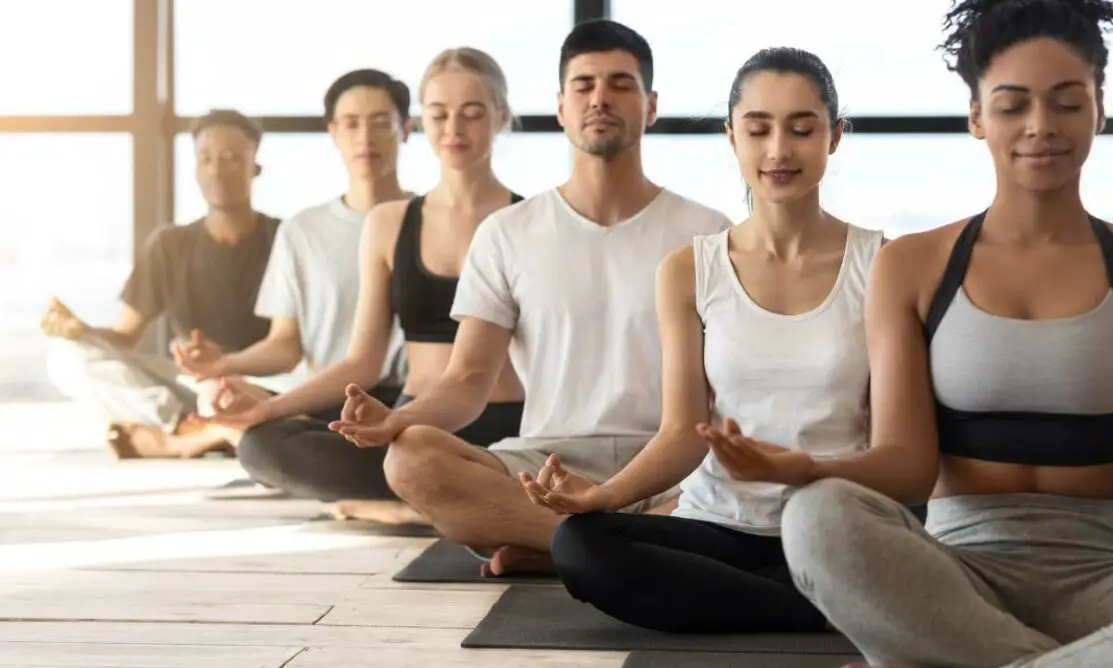Meditation is a powerful tool for calming the mind and body and can be used to reduce stress, improve focus, and increase overall well-being.
It is a simple practice that can be done anywhere, anytime, and requires no special equipment or training.
In this guide, we will discuss the basics of meditation, including how to get started, the different types of meditation, and the benefits of regular practice.
With a little bit of practice, you can learn to meditate and experience the many benefits it has to offer.
Exploring Different Types of Meditation: Which One Is Right for You?
Are you looking to get into meditation but don’t know where to start? With so many different types of meditation out there, it can be hard to know which one is right for you. Here’s a quick guide to some of the most popular types of meditation, so you can find the one that best suits your needs.
Mindfulness Meditation: This type of meditation focuses on being present in the moment and being aware of your thoughts and feelings without judgment. It’s a great way to reduce stress and anxiety and can help you become more mindful of your actions and reactions.
Guided Meditation: Guided meditation is a great way to get started with meditation if you’re a beginner. It involves listening to a voice that guides you through the meditation process, helping you to relax and focus on your breath.
Transcendental Meditation: This type of meditation involves repeating a mantra or phrase to yourself in order to reach a state of deep relaxation. It’s a great way to reduce stress and anxiety and can help you to become more mindful of your thoughts and feelings.
Yoga Meditation: This type of meditation combines physical postures with breathing exercises and meditation. It’s a great way to reduce stress and anxiety and can help you to become more mindful of your body and mind.
Loving-Kindness Meditation: This type of meditation focuses on cultivating feelings of love and kindness towards yourself and others. It’s a great way to reduce stress and anxiety and can help you to become more compassionate and understanding.
Movement Meditation: This type of meditation involves moving your body in a slow and mindful way. It’s a great way to reduce stress and anxiety and can help you to become more aware of your body and its movements.
No matter which type of meditation you choose, the important thing is to find one that works for you. Take some time to explore different types of meditation and find the one that resonates with you. With a little bit of practice, you’ll be well on your way to a more mindful and peaceful life.

How to Create a Daily Meditation Practice That Works for You
Are you looking to create a daily meditation practice that works for you? If so, you’ve come to the right place! Meditation can be a powerful tool for reducing stress, improving focus, and cultivating a sense of inner peace. But it can be hard to know where to start. Here are some tips to help you create a daily meditation practice that works for you.
1. Start small. Don’t try to meditate for hours at a time. Start with just a few minutes each day and gradually increase the length of your practice as you become more comfortable.
2. Find a comfortable spot. Choose a spot in your home or office that is comfortable and free from distractions. Make sure you can sit in a comfortable position without any pain or discomfort.
3. Set a timer. Setting a timer can help you stay focused and prevent you from getting distracted.
4. Focus on your breath. When you meditate, focus on your breath. Notice the sensation of the air entering and leaving your body.
5. Let go of expectations. Don’t expect to have a perfect meditation session every time. Let go of any expectations and just be present in the moment.
6. Be kind to yourself. Don’t be too hard on yourself if your mind wanders. Just gently bring your attention back to your breath.
Creating a daily meditation practice can be a great way to reduce stress and cultivate inner peace. With these tips, you can create a practice that works for you. Good luck!
The Benefits of Mindful Meditation: Why You Should Make Time for It
Are you feeling overwhelmed and stressed out? Do you feel like you’re constantly running on empty? If so, it might be time to make time for mindful meditation.
Mindful meditation is a practice that helps you to become more aware of your thoughts, feelings, and emotions. It’s a great way to reduce stress and anxiety, and it can also help you to become more mindful of your actions and reactions.
So, why should you make time for mindful meditation? Here are just a few of the benefits:
1. Improved Focus and Concentration
Mindful meditation helps to improve your focus and concentration. When you practice mindful meditation, you’re training your mind to be more aware of the present moment. This helps you to stay focused on the task at hand and to be more productive.
2. Increased Self-Awareness
Mindful meditation helps to increase your self-awareness. When you practice mindful meditation, you become more aware of your thoughts, feelings, and emotions. This helps you to better understand yourself and to make better decisions.
3. Reduced Stress and Anxiety
Mindful meditation can help to reduce stress and anxiety. When you practice mindful meditation, you’re able to take a step back and observe your thoughts and feelings without judgment. This helps to reduce stress and anxiety levels.
4. Improved Sleep
Mindful meditation can help to improve your sleep. When you practice mindful meditation, you’re able to relax and let go of the worries and stresses of the day. This helps to improve your sleep quality and can help you to wake up feeling refreshed and energized.
So, if you’re feeling overwhelmed and stressed out, it might be time to make time for mindful meditation. It’s a great way to reduce stress and anxiety, improve your focus and concentration, increase your self-awareness, and improve your sleep. So, why not give it a try?
How to Get Started with Meditation: A Beginner’s Guide
Are you looking to get started with meditation but don’t know where to begin? You’re not alone! Meditation can seem intimidating at first, but it doesn’t have to be. With a few simple steps, you can start meditating today and reap the many benefits it has to offer.
First, find a comfortable spot. You don’t need a special meditation room or anything fancy. Anywhere that’s quiet and comfortable will do. Sit in a comfortable position, either in a chair or on the floor. Make sure your back is straight and your feet are flat on the floor.
Next, close your eyes and take a few deep breaths. Focus on your breath and how it feels as it moves in and out of your body. Notice the sensations in your body as you breathe.
Now, start to focus on your thoughts. Don’t try to control them or push them away. Just observe them without judgment. Notice how your thoughts come and go, like clouds in the sky.
Finally, when you’re ready, start to focus on a mantra or phrase. This could be something like “I am peaceful” or “I am calm.” Repeat this phrase to yourself as you continue to focus on your breath.
That’s it! You’ve just completed your first meditation session. You can do this for as long as you like, but even just a few minutes can be beneficial.
Meditation can be a powerful tool for reducing stress, improving focus, and cultivating inner peace. So don’t be intimidated – give it a try today and see how it can help you!
Can I meditate lying down?
Yes, you can meditate lying down! In fact, it can be a great way to relax and get into a meditative state. Lying down meditation is especially helpful if you’re feeling tired or overwhelmed. It can be a great way to wind down after a long day or to take a break from a stressful situation.
When you meditate lying down, you can focus on your breath and body sensations. You can also use visualizations or mantras to help you relax. It’s important to find a comfortable position that allows you to stay still and relaxed. You can use a pillow or blanket to support your body and make sure you’re comfortable.
Lying down meditation can be a great way to get into a meditative state without having to sit up. It can also be a great way to relax and unwind. So if you’re feeling tired or overwhelmed, give it a try!
Can I meditate lying in bed?
Yes, you can totally meditate while lying in bed! In fact, it can be a great way to start or end your day. Lying down can help you relax and get into a meditative state more quickly. Plus, it’s a great way to get comfortable and really focus on your practice.
When you meditate while lying down, it’s important to make sure you’re comfortable. You can use a pillow or blanket to support your body and make sure you’re not straining any muscles. You can also use guided meditation to help you focus and stay in the moment.
If you’re new to meditation, lying down can be a great way to get started. It’s a comfortable and accessible way to practice, and it can help you relax and get into a meditative state. So why not give it a try?
Can I meditate with my eyes open?
Yes, you can meditate with your eyes open! It’s a great way to practice mindfulness and stay present in the moment.
Meditating with your eyes open can be a great way to stay focused and present in the moment. It can also help you to stay aware of your surroundings and be more mindful of your thoughts and feelings.
When meditating with your eyes open, it’s important to focus on your breath and be aware of your body. You can also focus on a particular object or image to help you stay present.
It’s important to remember that meditating with your eyes open is not the same as sleeping. You should still be aware of your thoughts and feelings and be mindful of your environment.
If you’re new to meditating with your eyes open, it’s best to start with short sessions and gradually increase the length of time. You can also try different techniques to find what works best for you.
So, if you’re looking for a way to stay present and mindful, give meditating with your eyes open a try!
Conclusion
Meditation is a powerful tool that can help us to reduce stress, improve our mental and physical health, and increase our overall wellbeing. It is important to find a practice that works for you and to be consistent with it. Start with short sessions and gradually increase the length of your practice. Be patient and kind to yourself and remember that meditation is a journey, not a destination. With regular practice, you will be able to reap the many benefits of meditation.



